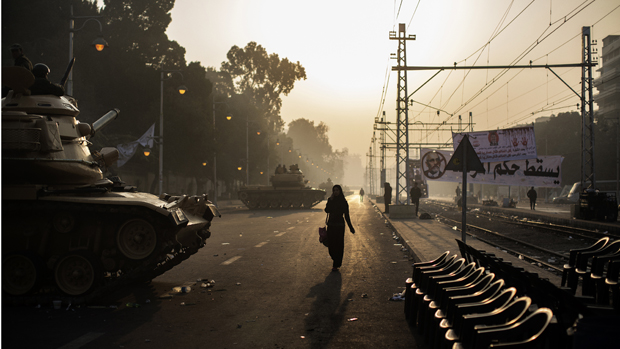 Egypt's main opposition alliance urged supporters to vote no in the referendum on a disputed constitution rather than a boycott, hours after Islamist President Mohammed Morsi's government forged ahead by starting overseas voting in diplomatic missions for expatriates.
Egypt's main opposition alliance urged supporters to vote no in the referendum on a disputed constitution rather than a boycott, hours after Islamist President Mohammed Morsi's government forged ahead by starting overseas voting in diplomatic missions for expatriates.
But the opposition said it still may boycott the vote starting in Egypt on Saturday if its conditions are not met.
The start of overseas voting after weeks of mass opposition protests showed the determination of President Mohammed Morsi to go forward with the process despite a three-week political crisis and deepening polarization over the proposed constitution.
Hamdeen Sabahi, one of the leaders of the opposition National Salvation Front [NSF], said at a news conference that the alliance would urge its supporters to boycott if judges do not oversee the vote and the state does not provide security at the polls. The country's major judges' union said Tuesday it would boycott the referendum and judges would abstain from their traditional role of oversight at the polls.
An Egyptian woman casts her vote on the draft constitution in Muscat, Oman, on Wednesday. More than 500,000 Egyptians expatriates are voting at embassies and consulates in 150 countries. (Mohammed Mahjoub/Agence France-Presse/Getty Images )
"The [NSF] decided to call upon the people to go to the polling stations and reject the draft by saying no,' said Sabahi, reading from a prepared statement. "The people will rally at the polls and have a chance to topple the constitution by saying no."
The Islamist-dominated constitution drafting committee rushed through the document in a marathon session last month. Islamists say its approval will restore political stability and allow the rebuilding of the institutions of government. They say it contains new articles banning many of the human rights abuses that were commonplace under Morsi's ousted predecessor, Hosni Mubarak.
Liberals, secularists, Christians and other critics say the draft is full of obscurely worded clauses that could give clerics a say over legality of legislation and allow civil rights to be curtailed by hardline interpretations of Islamic Shariah law. They say the 100-member constituent assembly tasked to draft the constitution was packed with Islamists and ultraconservatives who ignored other groups' concerns and sped the draft through.
Judges' union won't supervise vote
The full vote was initially scheduled to take place on Dec. 15, but in a last-minute decree on Tuesday, Morsi ordered the voting stretched into another round on Dec. 22. Voting must be overseen by judges, but the powerful judges' union voted late Tuesday not to supervise the process, protesting an earlier and now rescinded decree by Morsi placing him above judicial oversight.
Their absence is likely to damage the legitimacy of the process, and thus the legitimacy of the constitution itself, among much of the public.
It was not immediately clear whether the judges will now oversee the voting after the opposition said it would participate in the referendum. But the judges have all along said their stand is inspired by what they see as Morsi' assault" on the judiciary and the siege of the nation's highest court by Islamists loyal to Morsi.
Anti-Morsi protesters shout slogans as they stand under the Egyptian flag in Cairo on Tuesday. The opposition is calling on supporters to vote no in this weekend's referendum. (Amr Abdallah Dalsh/Reuters)
Zaghloul el-Balshi, head of the referendum's organizing committee, said on Tuesday that 9,000 judges had agreed to oversee the voting. His claim could not be independently verified. The total number of polling stations in Egypt reaches nearly 13,000, each of which normally requires a judge.
Aides to Morsi said before that judges are only needed to supervise the 9,000 main stations, while government employees or university professors can fill in at the rest.
The vote overseas could give hints at which direction the referendum is going. Egyptian expatriates in the Gulf are known to lean toward Islamists, while others in Europe and Australia, among them a large number of Christian migrants, lean more toward liberals.
Expats vote in 150 missions worldwide
Presidential spokesman Yasser Ali described the vote as the "first step toward constructing democracy after the (2011) revolution."
In the Egyptian Embassy in Sanaa, Yemen, a handful of voters showed up after the vote started at 8 a.m. local time Wednesday. Mohammed Abdullah, a physician, said he voted yes because he wants stability, and any changes could be made later.
"We can make whatever amendments we want but we have to get through this and return to normalcy," he said.
The Middle East News Agency said Egyptian expatriates have until Saturday to cast ballots in 150 diplomatic missions worldwide.
Two months after passing the referendum, the country is scheduled to have new parliamentary elections. A parliament elected after the uprising was disbanded after courts ruled the elections law was unconstitutional.



